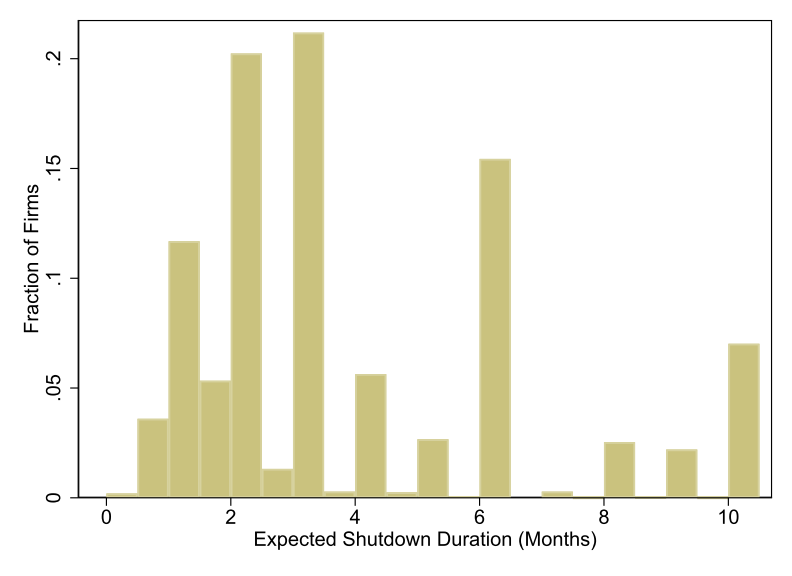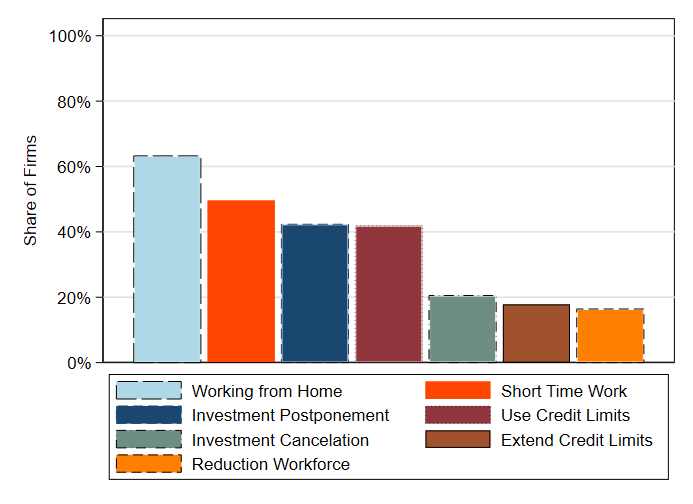The COVID-19 pandemic that spread globally in early 2020 forced governments to implement drastic measures to mitigate the exponential rise of infections and deaths. In Germany, like in many other countries, these measures resulted in a shutdown of a significant share of economic activity, without a clear perspective of when the situation would be back to normal. This forced firms to take a wide range of important business decisions to cope with the crisis.
In a new IZA discussion paper, Lukas Buchheim, Jonas Dovern, Carla Krolage, and Sebastian Link study those decisions. In particular, they analyze how firm characteristics, pre-crisis firm health, and, most notably, firms’ expectations regarding the duration of the crisis explain heterogeneity in the mitigation strategies of firms.
Representative survey on German firms’ reaction to the COVID-19 crisis
The paper builds on data from the ifo Business Survey (IBS), a monthly survey among a representative sample of German firms from all relevant sectors. The April survey contained a number of special questions on managerial decisions and expectations in the wake of the COVID-19 crisis.
The study shows that there is considerable heterogeneity in firms’ expectations of the likely duration of restrictions to public life. These expectations range from 0.5 months to 36 months with a median of 3 months (see Figure 1).
Figure 1: Distribution of Expected Shutdown Duration

The study also shows heterogeneity in the business decisions that firms implemented by April to mitigate the effects of the COVID-19 crisis. The most frequently mentioned response is having employees work from home (63% of firms, see Figure 2). Half of the firms report to use the short-time work scheme, which is an employment subsidy paid by the German employment agency (Bundesagentur für Arbeit). In addition, 16% of firms report that they have already reduced their workforce. Many firms are also reluctant to invest and have either postponed investment projects (42%) and/or canceled them altogether (21%).
Figure 1: Frequency of Managerial Mitigation Responses

Interestingly, the authors find a close relation between the expected duration of the crisis and the choice of mitigation strategies: Firms that expect restrictions to public life to last longer are more likely to implement measures that are hard to reverse, such as laying off employees or canceling investment projects. For instance, firms with duration expectations of more than four months are four percentage points more likely to lay off (parts of) their workforce than firms that expect a shorter shutdown. Likewise, they are about five percentage points more likely to postpone or cancel investment projects compared to firms that expect the shutdown to last for two months at most.
The study also finds that:
- Firms with lower pre-crisis health (measured by the reported business conditions during the last quarter of 2019) are more likely to have implemented strong mitigation responses, such as laying off employees or canceling investment projects.
- The expected duration of the crisis at best weakly affects the initial impact of the COVID-19 pandemic on firms.
- The expected duration of the crisis has substantial effects on the expected effect of the COVID-19 crisis on revenues, business expectations, and business uncertainty.
- Firms with bad conditions before the crisis report to be hit harder relative to firms with neutral conditions, whereas firms with good prior conditions are, ceteris paribus, less affected.
Implications for policy responses to the COVID-19 pandemic
Based on their results, the authors conclude that the (expected) length of the shutdown and, in extension, the time path for reopening the economy are key statistics for how firms choose to deal with the crisis. Clearly communicating these plans thus helps to prevent potentially costly planning mistakes. Moreover, the results suggest that the crisis amplifies pre-crisis vulnerabilities, suggesting that already weak firms may need more public assistance to survive the crisis if this is in the public interest.
Note: This project received funding under the IZA COVID-19 Emergency Research Thrust.
